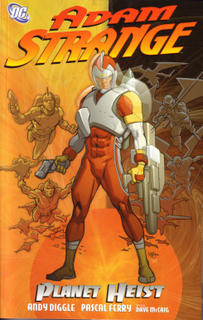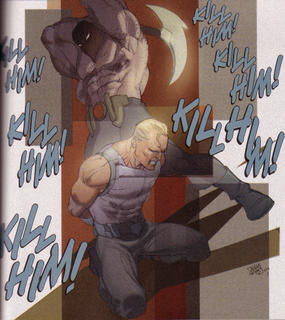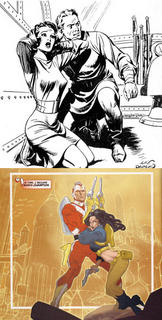Planet Heist
 Is "Hard-Boiled Space Opera" even a genre?
Is "Hard-Boiled Space Opera" even a genre?
I can't think of many other examples, so Planet Heist seems to stake its' claim to a new, edgy style of movie-serial sci-fi. The early issues, especially, have a "Buck Rogers meets Sin City" vibe that feels fresh and new and right. Planet Heist manages to feel classic and modern at once: clearly inspired by Flash Gordon and the space opera of yesteryear, but never feeling like pastiche or homage. Diggle and Ferry are working with concepts and structures that still tick, and skillfully wrap that old skeleton in new flesh.
The biggest skeleton here is Adam Strange himself, who Diggle writes to perfection: Strange isn't the smartest guy in the DCU, but he sure is the cleverest. Diggle sends Adam Strange back to his roots as a quick-thinking adventurer who doesn't know how to quit. Diggle also keeps the character focused on the thing that makes Strange unique in mainstream comics: he's a husband and father, and it's the most important thing in his life. That solid emotional core is what anchors this mad tale of missing planets, clones, and star-eating demons. Regardless of the wild situations, you're always along for the ride because Strange's motivation is so clear and simple: get home to see his wife and child.
Though it's a relaunch it never feels like Diggle's trying to reinvent the wheel. He's given the character new life without feeling the need to have his "take". This is the same Adam Strange that Julie Schwartz created in 1958, without the need for dark retcon. In place of a drastic revision, Diggle makes the simple choice to take the character and write the heck out of him. Instead of being shamed by the cosmic players of the DCU like L.E.G.I.O.N. and the Omega Men, he celebrates them with high adventure and snap-crackle-pop dialogue. This is sci-fi as fantasy, a far cry from the "hard" sci-fi that's seen in the work of Warren Ellis, for example. While "hard" sci-fi is all well and good, there's still mileage in the simpler stylings of old fashioned space opera. It's sci-fi that doesn't worry too much about detail, and is structured like the old movie serials with excellent cliffhangers at the end of each issue like alien executioners with their axe swinging towards our hero's neck.
 Pascal Ferry and Dave McCaig really nail the look of the book. It seems clearly inspired by Alex Raymond, the creator of Flash Gordon. (The picture on the left shows a comparison of Raymond and Ferry.) The art is not trying to ape or imitate Raymond, but rather to hit the same notes he did: classical lines that lend the proceedings an air of epic and poetry. It's a painterly look that fits as well in the mean streets of Gotham City as it does orbiting a star in a parallel universe.
Pascal Ferry and Dave McCaig really nail the look of the book. It seems clearly inspired by Alex Raymond, the creator of Flash Gordon. (The picture on the left shows a comparison of Raymond and Ferry.) The art is not trying to ape or imitate Raymond, but rather to hit the same notes he did: classical lines that lend the proceedings an air of epic and poetry. It's a painterly look that fits as well in the mean streets of Gotham City as it does orbiting a star in a parallel universe.
Though the series take an abrupt left turn at the end when it suddenly becomes co-opted to set up The Rann-Thanagar War miniseries (and Diggle seems none too pleased), it doesn't really lessen the overall effect of the series. A more finite conclusion would have helped, but it certainly seems in keeping with the character that while the immediate crisis is over, that conclusion is just another cliffhanger. Adam Strange is always headed towards the next adventure.

1 comment:
Wait a second. You're not mad that this goes right into the Rann-Thanagar war? Shouldn't you be calling for Didio's head?
Actually, its nice to read a positive review that's clean of any of the politics that's permeating comic blogs as of late. I read the first few issues, but found myself not particularly into Space Opera, at least at the time. However after reading Alan Moore's Adam Strange in Swamp Thing, I'm interested in checking out some of the older and newer stuff.
Keep up the good blogging.
Post a Comment